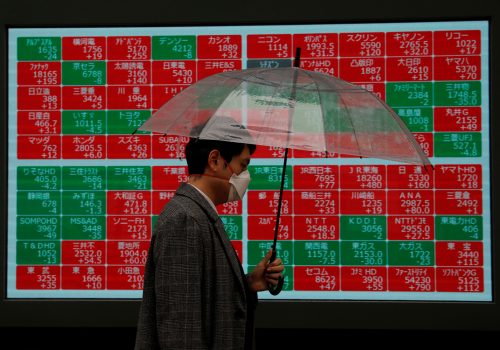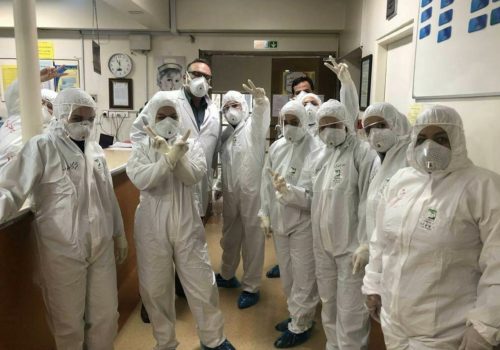CORONAVIRUS ALERT 3/4/2020
The Atlantic Council’s Coronavirus Alert is a regular summary of policy, economic, and business events around the emergency. To stay updated, email coronavirus@atlanticcouncil.org with “Subscribe” in the subject line.
SUMMARY:
The World Bank has promised more than $10 billion in support to developing countries to help them contain the spread of the virus. Cases surged in South Korea, Malaysia, and India, while Italy closed all its schools and universities for two weeks.
STATISTICS:
There are more than 94,000 cases worldwide in more than seventy countries; more than 3,200 people have died.
QUOTE: “The virus and measures being taken to contain it will weigh on economic activity here and abroad for some time,” Chair of the Federal Reserve Jerome Powell, quoted in The Wall Street Journal.
HEALTH AND SCIENCE
- The number of cases surged in South Korea, with most in and near the city of Daegu, Reuters reported. Thousands of people are awaiting hospital beds. Cases have also risen in Malaysia and India, Bloomberg said.
- Nine people have now died in the United States, all in Washington state, with two earlier deaths there now tied to the virus. There are also cases in Oregon, New York City, California, Illinois, Wisconsin, New Hampshire, Georgia, Rhode Island, Texas, Arizona, and Florida. Of the more than 120 new cases of coronavirus in the United States, at least twenty-one are in the Seattle area, CNN reported.
- Any American with a doctor’s order can now be tested for coronavirus, Vice President Mike Pence said, describing criteria set by the US Centers for Disease Control and Prevention.
- An official from the European Defence Agency has reportedly tested positive for coronavirus after returning from a trip in Italy. The EU agency has cancelled all its meetings until March 13 as a precaution, Euractiv reports.
- All 1,150 students in a high school in Israel are under quarantine, after a ninth grader tested positive for the virus, ynet reported.
- More hospital patients in the UK will be seen via video link to reduce the risk of transmission, BBC News reported. The UK now has fifty-three reported cases of Coronavirus.
- NPR looks into the possible reasons why the death rate in China outside Wuhan, the outbreak’s epicenter, has been much lower. “When it comes to the spiralling global coronavirus outbreak, scientists are still trying to pin down the answer to a basic question: How deadly is this virus?” NPR says.
- “The age-related death risk probably reflects the strength, or weakness, of the respiratory system,” the news service Stat said in a breakdown of demographic risk factors. “Youth, in contrast, seems to be protective.”
- Shimadzu Corp. plans to release a testing method that detects the virus in one hour, compared with the current six-hour wait, by the end of March, Kyodo News reported
QUOTE: “It’s very clear that the actions taken in China have almost brought to an end their first wave of infections,” Professor Benjamin Cowling, an infectious disease expert at Hong Kong University, quoted in the New York Times.“The question is what will happen if there’s a second wave (…) because the kind of measures that China has implemented are not necessarily sustainable in the long term.”
FINANCE AND ECONOMICS:
- Asian and European stocks settled following a sell-off on Wall Street that came in spite of the Fed’s surprise interest-rate cut, the Financial Times said. Central banks took action in an attempt to staunch some of the worst economic impacts of the virus.
- The risk of recession has increased enough to “warrant a Federal Reserve shock-and-awe approach,” The Wall Street Journal quoted Tiffany Wilding, an economist at Pacific Investment Management Co., as saying.
- The World Bank has pledged $12 billion in aid to help developing countries cope with the spread of the virus, BBC News said.
- “As the virus spreads beyond Asia, the oil market will continue to suffer losses, but the question remains: how deep and for how long?” asks the Atlantic Council’s Reed Blakemore. “[T]he speed of the coronavirus’ spread makes it increasingly likely that this downturn might be a longer trough than currently expected.”
- Eight charts show the wide-ranging economic impact of the virus – from consumer spending including on cars and mobile phones, growth forecasts and markets, pollution and air travel, as well as the appetite for gold.
QUOTE: “They’re young,” NPR cites Anna Yeung-Cheung, a microbiologist at Manhattanville College in New York, as saying of many health workers in China. Yeung-Cheng, originally from Hong Kong, says many doctors there died during the SARS coronavirus outbreak in 2002 to 2003. “But we need to take into account the stress that they are undergoing. This is stress to their body.”
BUSINESS AND TRAVEL
- The European Central Bank restricted all non-essential travel until April 20 and suspended conferences, except for monetary policy press conferences.
- Japan said it would be possible to delay the summer Olympic Games until later in the year, the country’s Olympics minister told a parliamentary committee.
- Google and Microsoft will offer free access to their teleconferencing and collaborative work tools for a limited time to help people to work remotely, The Verge reported.
- Google has cancelled a developer conference that was set to be held in May in Mountain View, TechCrunch reported.
QUOTE: “Growing numbers of companies [in the Euro area] are reporting lost business due to the virus spread, notably in sectors such as hotels, travel, transport and tourism but also even in areas such as financial services.” Chris Williamson, an economist at IHS Markit, cited by Bloomberg.
RESOURCES
- Johns Hopkins University interactive web-based dashboard to visualize and track reported cases in real-time.
- CDC provides frequent updates and background information on Coronavirus.
- The World Health Organization daily situation reports.
- Harvard Business Review guidance on managing the emergency for corporate decisionmakers.
- The Society for Human Resource Management resources on managing communicable diseases.
- The Wall Street Journal has a useful guide to travel and travel insurance.



